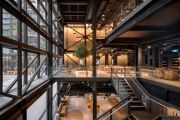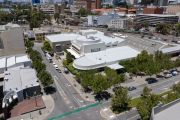
‘Business as usual’ for Selina’s Australian ‘flashpacker’ hotels
Budget hotel operator Selina’s Australian properties are the most profitable across the group’s more than 100 sites and will not be impacted by the collapse of the brand’s London-based parent company, its chief operating officer has told The Australian Financial Review.
“It’s business as usual for our Australian hotels,” said Sydney-based Gadi Hassin. “While the mother company is going into administration, this is not the case for us [in Australia].”
Selina operates four backpacker-style hotels in Australia: two in Melbourne, one in Brisbane and one on Magnetic Island near Townsville.
The global chain launched in 2014 with just one property but has grown exponentially since then. It repurposes existing hostels, adding co-working spaces, funky food and beverage offerings, and social networking events to appeal to digital nomads and millennials.

Mr Hassin accepted that an “awkward” situation had been created by Nasdaq-listed Selina Hospitality appointing administrators this week due to looming insolvency. But he said this did not impact the operations of hotels by its country-based subsidiaries, including in Australia.
“The Australian business is not insolvent and is operating as usual. It’s a profitable company that last year generated earnings before interest, taxes, depreciation, and amortisation of $3 million – just from four properties.”
Further insulating the Australian business from the woes of its global parent, Mr Hassin said, was the fact that it was one of the few Selina subsidiaries not 100 per cent owned by its parent.
This came about at the start of July, when Selina Hospitality sold a 42.9 per cent stake in Selina Holding Australia to Osprey International Limited (an affiliate of education provider Global University Systems) for about $5.3 million, valuing the Australian business at over $18 million.
The Australian business has a $5.7 million loan to lender Dorado Capital, secured by a corporate guarantee, and mortgages over the leases for three of the Australian properties.
Mr Hassin said Selina’s Australian landlords, who received performance-based fees in addition to rent, were “very happy” with its tenants.
London-based Selina Plc had a market cap of US$1.2 billion ($1.8 billion) when it listed on the Nasdaq in 2022. But it is now worth just US$21.5 million after losing 99 per cent of its value.
Problems for Selina stem from its inability to generate sufficient cash flow to meet its debt obligations, resulting in a default.
Selina is also facing potential delisting from the Nasdaq due to its share price consistently trading below $1 per unit in breach of the bourse’s rules.
“The board of directors of the company has resolved that the company no longer has any reasonable prospects of avoiding an insolvency,” Selina noted on Monday in an SEC filing after appointing administrators from FTI Consulting.
Selina entered the Australian accommodation market in 2022, opening hotels in Central Melbourne, St Kilda and Brisbane after taking over properties previously leased by the Tourism Adventure Group. It later added a fourth property on Magnetic Island, near Townsville and had ambitions to grow to a network of up to 40 properties across Australia and New Zealand.
The group offers both private suites and communal rooms complemented by co-working facilities, cooking classes and music events targeted at digital nomads, Gen Z and Millennials. Much of the buzz about Selina is generated via social media.
It’s one of several new brands that have targeted the backpacker sector (with the support of investors) after it was hit hard by the pandemic but with a focus on a more upmarket “flashpacker” offering.
Another player is the Drifter Hospitality Group, which operates backpacker lodges in New Zealand, It will soon open a property in Byron Bay, according to its website.











